2018 Coding Bootcamp Industry and Outcomes Report
Job Placement, Market Trends, and Demographics
Overview
SwitchUp is excited to present our second annual Coding Bootcamp Industry and Outcomes Report. Over the past year, we have gathered and analyzed survey data from over 1,500 coding bootcamp graduates. In this report, we highlight the most helpful insights from studnets who attended bootcamps, including job placement, salary trends, and demographic data.
Check out a summary of our findings below.
Student Demographics
Respondents self-reported demographic data for a variety of variables such as gender, age, and education level. These data help to construct a profile of what types of students pursue and graduate from bootcamps worldwide. Our findings are summarized below.
Gender
In coding bootcamps, male graduates outnumber female graduates. However, the distribution is much closer to equal than that for traditional computer science degree programs in which 79% of degrees are granted to male graduates. Additionally, the "non-binary" category below includes those who self-identified as "non-binary", "transgender", or "other".
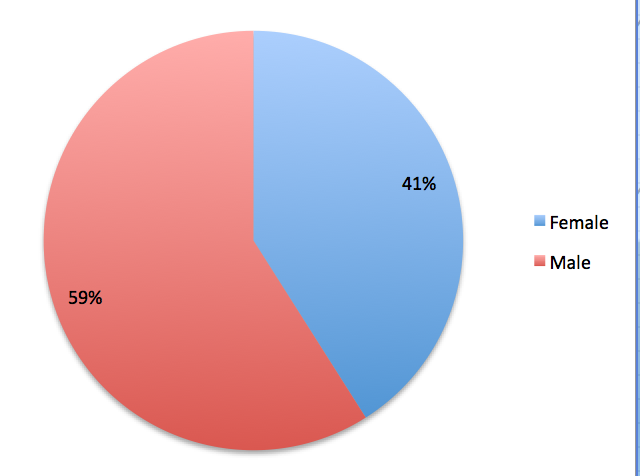
Age
The average age of our respondents is 30.6 years old. The youngest graduate to respond was 15 years old; the oldest graduate was 75 years old.
Average Age
30.6 years
Median Age
29.0 years
Race
Although bootcamps are making positive strides in regard to diversity, the sector still struggles with a racial disparity. The distribution of coding bootcamp graduates can be seen below. The most represented race is white (60.5%), followed by asian (19.0%). Though the majority of graduates are white, minority representation has been growing year over year.
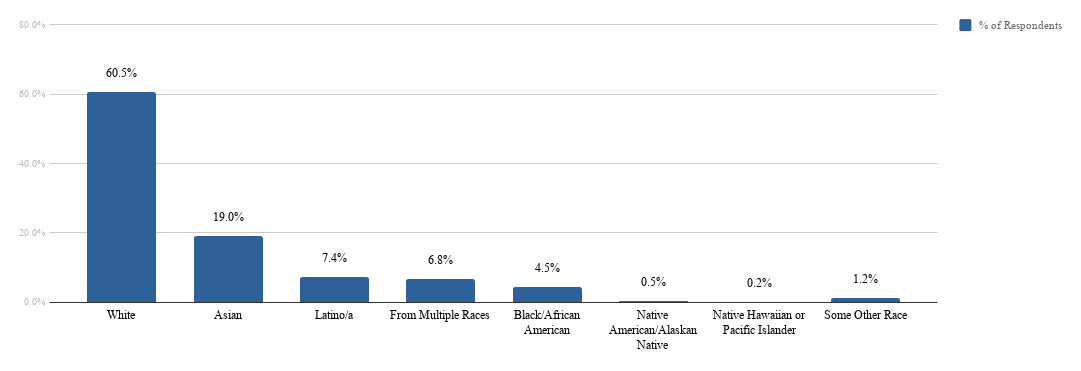
Citizenship
A majority of respondents reported being a U.S. citizen, most of whom were born in the US compared to going through the naturalization process. However, as the survey was distributed online and globally, graduates who are not U.S. citizens have substantial representation, making up over a third of the total responses.
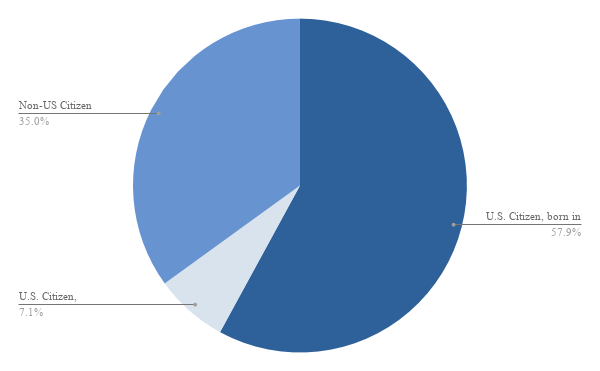
Educational Background
Most coding bootcamp graduates have obtained at least a Bachelor’s degree, although a large percentage (81.4%) of these individuals did not receive their degree in computer science related fields. The degree subject fields with the highest representation are: business, social sciences, physical sciences, computer science, and arts.
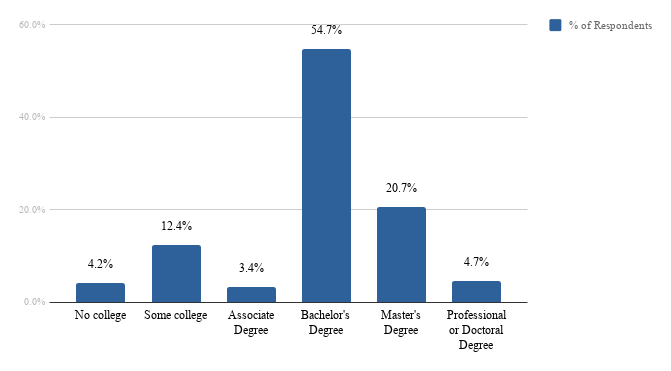
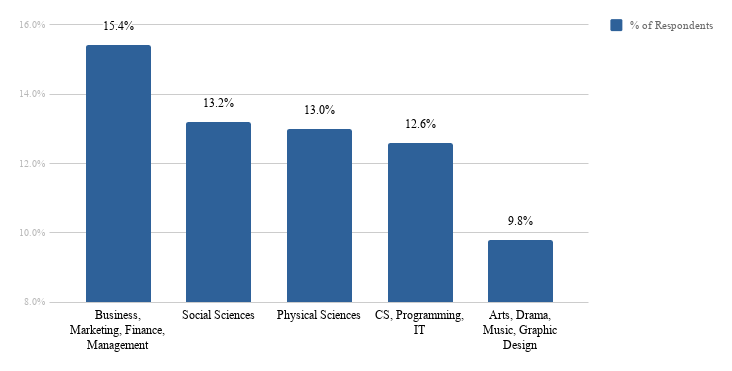
Programming Experience
Over half of our coding bootcamp alumni had 0 - 50 hours experience with computer programming prior to starting a bootcamp program. Of those that fell into this category, 44.8% had never programmed before, making up 26.0% of total respondents.
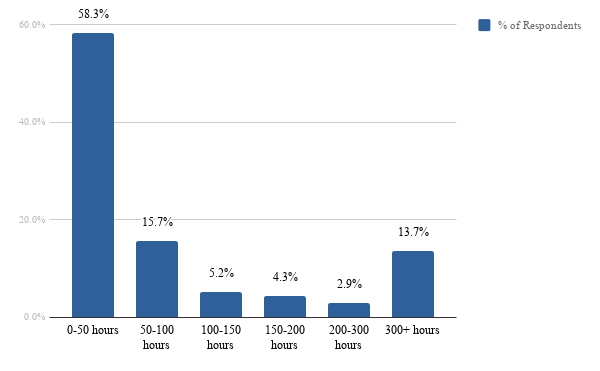
Reason for Attending
Bootcamp graduates had a variety of motives for enrolling in bootcamps, however advancing their careers was the most popular response. The success of bootcamp programs is reflected in our employment statistics, showing that 80.9% found employment and 43.7% reported a substantial salary increase of $10,000 or more for their first job after graduating from a bootcamp. Beyond employment, learning programming-related skills was another popular motive for attending a coding bootcamp.
| Reason for Attending | Percent of Respondents |
|---|---|
| Career advancement | 73.9% |
| To gain general technical training from the bootcamp curriculum | 49.9% |
| To follow my a passion and interest in programming | 48.1% |
| To learn in an immersive, fast-paced, and social atmosphere | 42.6% |
| To learn a specific language or skill | 36.3% |
| To gain important contacts with employers and job support | 30.9% |
| To network with other students and mentors | 25.1% |
| To gain technical skills to create a start-up company or other personal project | 15.4% |
Program Demographics
Our respondents provided information about the cost, class size, and curriculum of their programs. Below, we have aggregated the key findings from these data. Although these findings create a profile of bootcamps as a whole, individual coding bootcamps can vary greatly. It is important to ensure you understand a program’s offerings and characteristics before enrolling.
Cost
Respondents who attended a full-time or part-time bootcamp program spent an average of $9,178 on a coding bootcamp. The table below shows the distribution of programs within the listed cost categories. The majority (59.4%) of bootcampers spent less than $10,000.
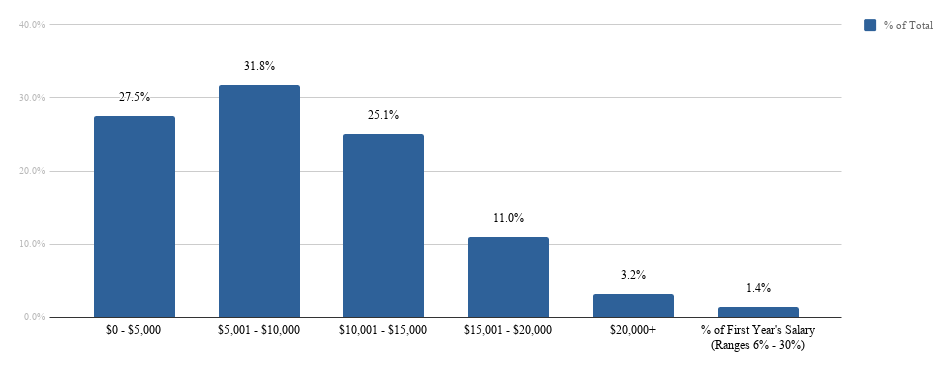
Class Size
Coding bootcamps offer more intimate learning environments than one may find at traditional universities, with more opportunity for interaction with instructors and fellow students. The average bootcamp class has just under 20 students and more than 4 instructors in the classroom.
Number of Students
19.8
Number of Instructors
4.2
Student to Teacher Ratio
4.7 : 1
Curriculum
For most bootcampers, the primary benefit of a bootcamp is the ability to learn technical skills that can be used in a new job after graduation. Below are the top 3 most popular computer programming languages and technologies in our sample of coding bootcamps.
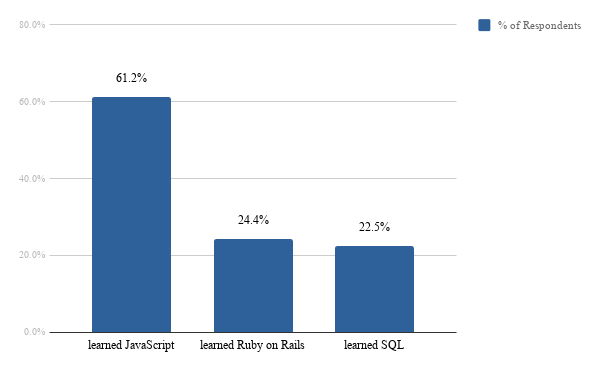
In addition, 51.3% of students learned HTML and 47.9% of students learned CSS as a foundation for their bootcamp curriculum.
Delivery Method
In-person coding bootcamps are the most popular delivery method (71.6%). However, bootcamps that provide a combination of in-person and online education (20.0%) as well as exclusively online programs (8.4%) are increasing in popularity.
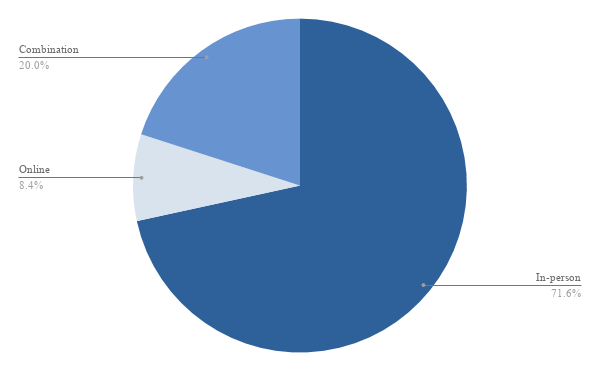
Location
Amidst the rise of online and remote programs, coding bootcamps are still being offered in numerous cities all across the globe. Below are the 10 most popular cities for in-person learners.
| City | In-person Respondents |
|---|---|
| New York City | 8.7% |
| San Francisco | 7.8% |
| Chicago | 5.9% |
| London | 4.3% |
| Toronto | 4.3% |
| Barcelona | 3.9% |
| Denver | 3.8% |
| Boston | 3.3% |
| Vancouver | 3.2% |
| Miami | 3.1% |
Continental Breakdown of Students Outside U.S.
Drawing from those that attended a coding bootcamp outside of the United States, the following table shows the continental distribution of where these students attended a program. In total, 31.6% of students who specified their location came from outside of the United States.
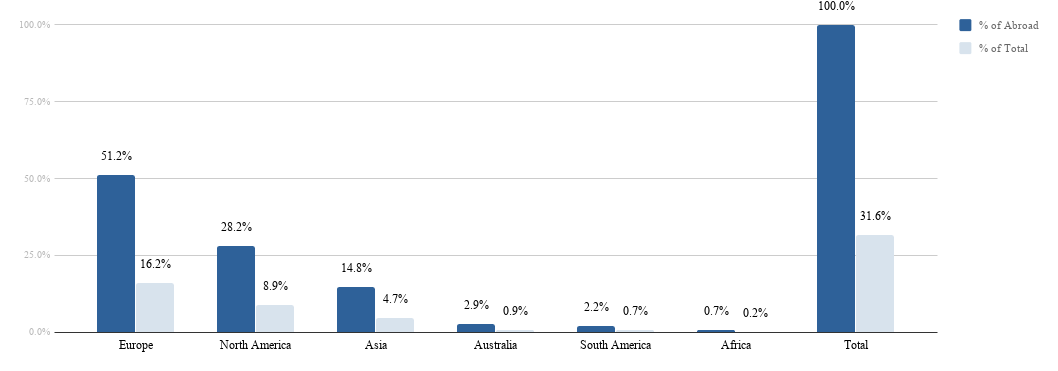
Employment Outcomes
Respondents self-reported their employment status and salary prior to and upon graduating from a coding bootcamp program. We analyzed this data to find the professional benefits of attending a bootcamp and broke this down by demographic to see who fared the best in their post-bootcamp professional pursuits.
Salary Increase
On average, coding bootcamp alumni saw a $19,485 (45.6%) salary increase in their first job after completing a program compared to the job they had pre-bootcamp. In addition, 43.7% of respondents reported a substantial salary increase of $10,000 or more after finishing a bootcamp.

Employment Statistics
Upon finishing a bootcamp, 80.9% of alumni were employed, 71.0% of which were working full-time.
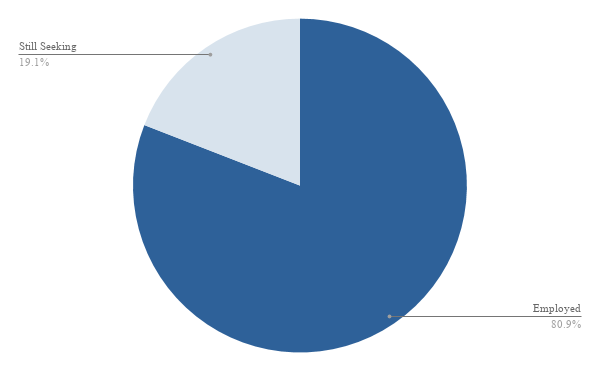

Job Field
After attending a bootcamp, 47.0% of respondents worked in the computer science and computer engineering industry, compared to 17.0% that worked in this field before starting a bootcamp.

Gender and Employment Outcome
While male bootcampers saw a slightly higher average salary increase than female bootcampers ($17,690 vs. $16,765, respectively), female graduates were employed at a slightly higher rate after finishing a bootcamp compared to their male counterparts (82.7% vs. 80.6%, respectively). Gender seems to have a negligible effect on professional outcome for bootcamp graduates, as both groups experience similar average salary growth and employment rates after finishing a bootcamp.
| Gender | Pre-Bootcamp Salary | Post-Bootcamp Salary | Employment % |
|---|---|---|---|
| Male | $44,105 | $61,795 | 80.6% |
| Female | $44,875 | $61,640 | 82.7% |
Race and Employment Outcome
When breaking down professional outcomes by racial groups with sufficient sample sizes, our graduates saw similar results. While all racial groups saw an increase in average salary in their first job after a bootcamp, those who identified as Asian saw the highest average post-bootcamp salary ($67,528) and the highest increase in salary ($22,983). Those who identified as white were employed at the highest rate after completing a bootcamp program (84.0%).
| Race | Pre-Bootcamp Salary | Post-Bootcamp Salary | Employment % |
|---|---|---|---|
| White | $44,707 | $61,237 | 84.0% |
| Asian | $44,545 | $67,528 | 75.5% |
| Black/African American | $41,666 | $61,279 | 79.3% |
| Latino/a | $40,641 | $53,214 | 77.9% |
Education Level and Employment Outcome
Attending a bootcamp had the greatest positive effect on the average salary of bootcampers who did not have a college degree prior to enrolling ($22,865 increase). Those with a master’s degree or higher prior to enrolling in a bootcamp had the highest employment rate upon completion of a bootcamp (85.7%).
| Highest Education | Pre-Bootcamp Salary | Post-Bootcamp Salary | Employment % |
|---|---|---|---|
| No College Degree | $31,420 | $54,285 | 75.8% |
| Associate Degree | $42,547 | $59,516 | 71.7% |
| Bachelor's Degree | $44,181 | $62,724 | 81.4% |
| Master's Degree or Higher | $50,474 | $62,004 | 85.7% |
Curriculum and Employment Outcome
We found little difference in the average salary increase and employment rates for bootcampers who learned the most popular 5 languages and technologies. Although the disparities were miniscule, those who learned SQL had a slightly higher increase in average salary than others ($21,536) and those who learned JavaScript had the highest employment rate (81.5%). Nonetheless, all languages and technologies proved useful, as they all led graduates to substantial average salary increase and a relatively high employment rate.
| Language/Technology Learned | Pre-Bootcamp Salary | Post-Bootcamp Salary | Employment % |
|---|---|---|---|
| JavaScript | $38,951 | $59,516 | 81.5% |
| HTML | $37,855 | $55,271 | 80.7% |
| CSS | $37,900 | $55,209 | 80.1% |
| Ruby on Rails | $40,220 | $57,995 | 81.1% |
| SQL | $40,014 | $61,550 | 79.7% |
Student Satisfaction
In addition to collecting objective information about coding bootcamp students, programs, and outcomes, one section of the SwitchUp survey is dedicated to collecting subjective data about students’ experiences in and satisfaction with the program they attended. Below you will find a summary of respondents’ satisfaction with their programs, their job outcomes, and their salary outcomes.
Satisfaction with Education
On average, graduates rated the education of their selected program 4.4 out of 5. 89.5% of respondents were satisfied or very satisfied with their selected program.
Satisfaction with Job Outcome
Graduates rated their post-bootcamp job outcome 4 out of 5 on average. 67.2% of respondents were satisfied or very satisfied with their post-bootcamp job outcome.
Satisfaction with Salary Outcome
Graduates rated their post-bootcamp salary an average of 3.8 out of 5. 61.5% of respondents were satisfied or very satisfied with their post-bootcamp salary.
Recommend to Friend
93.0% of coding bootcamp alumni would recommend their program to a friend.

Methods
This survey was posted on the SwitchUp site to collect responses from graduates of coding bootcamps. Coding bootcamps are defined as curriculum-based instruction in a programming or software engineering field. A coding bootcamp must not offer accredited degrees. Of the 2,349 survey responses we received, 1,567 met our criteria for inclusion listed below. All data was self-reported by respondents voluntarily. Our survey continues to be live on-site and collecting responses.
Surveying Criteria
To qualify for inclusion in the survey, individuals must have completed a course offered by a coding bootcamp (as defined above). Students who dropped out, failed to pass, or only applied to courses were not allowed to participate. The majority of alumni involved in the survey have also left reviews on SwitchUp and outreach was conducted via email with optional participation/distribution from schools. The survey was opt-in and optionally anonymous.
Response Inclusion Criteria
In order to be included in our analysis, respondents must have completed the survey in its entirety between January 2017 and July 2018. In addition, open-ended responses that were not relevant to the question were eliminated or coded as an "Other" response.
Incentives
All respondents participated in the survdey voluntarily. A chance to win a $2,000 Amazon giftcard served as an incentive for participation.
About SwitchUp
SwitchUp helps aspiring technology professionals to develop skills for a new career with recommendations that are straight from the alumni of coding, design, data science and numerous other training programs around the world. They equip learners with the latest school news, information about scholarships, details about financial aid, career tips, and academic research about technology education. Their blog and newsletter offer free advice on how to choose the best bootcamps and programs that meet the unique needs and goals of prospective students.

